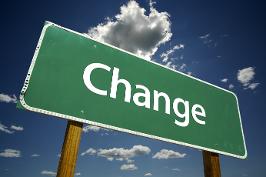
In-Transition Coaching
When areas of our lives are going well, we tend to coast—to take it as a gift or take it for granted—but in any case, to let it be. That changes when we either want more of a challenge or when a challenge, a change, is foisted on us. We begin or end a job, a relationship, an educational experience, or we experience one of life’s milestones. We become in transition, but it is not only some aspect of our life that it is transition—it is also some aspect of our identity.
It is some aspect because we know from many decades of psychological research that a given individual is, in fact, different across contexts—that is, each of us has a variety of identities or alter egos (kind of like Superman and Clark Kent), with at least a somewhat different alter ego for each different context. For instance, how you are with your family is likely to be different than how you are at work, and how/who you are with your boss will be at least somewhat different than how/who you are with someone who reports to you.
We also know from psychological research that more you inhabit an alter ego—you behave as you would like to be—the more it actually becomes a part of you in that context. In fact, cognitive behavioral therapy capitalizes on this process by helping people change their behavior and thoughts, which in turn change their feelings, self-concept, and identity.
If you are in transition in some aspect of your life and wanting to figure out the next steps, in-transition coaching may be right for you. Examples of transitions into, or out of, for which In-Transition coaching can be helpful include:
- jobs, positions, companies
- relationships (romantic, marriage, family, friends, colleagues)
- living with children
- educational or training experiences
- moving
- health status changes
- grief
- self-discovery
- optimizing your talents or abilities (your “gifts”).
My coaching style as been described as warm, direct, positive, and challenging. I help my clients get clear on their values and goals, the parts of themselves they’d like to develop, and the paths forward to become more of the person they’d like to be.
Questions about Coaching?
Click here for an FAQ about coaching.
My coaching policies are here.
Thanks for your interest
To make an appointment, contact me:
Robin (at) DrRobinRosenberg (dot) com
650-440-5534
"Dr. Rosenberg brings expertise, wisdom and practical life experience to any mother struggling with work life balance or any woman deciding what her priorities are. With her help I learned to find my superpower of making tradeoffs based on what really matters to me. Finally I let myself off the hook for what I wasn't doing, and made choices I could feel good about by banishing outdated ideals of perfection in all realms. Dr. Rosenberg has been there herself and with her help you can go farther than reclaiming sanity--and stake your claim to your superpower!"
–Lara Honos-Webb, Ph.D., coach and author of The Gift of ADHD and Listening to Depression.

Robin S. Rosenberg, Ph.D., ABPP
Examples of Transitions for In-Transition Coaching
Educational/Training
- Think about or begin some type of educational experience (e.g., college, graduate school, vocational, specific skill training)
- Graduate from, leave without graduating, or be asked to leave an educational/training experience.
Relationships
- Romantic:
- Become single after a relationship ends
- Pre-marital coaching
- Marital coaching
- Friendships:
- Figure out the different types of friendships that tap into the different parts of you
- Learn when you want to be with certain types of friends versus others
- Work--Change relationships with colleagues as you or they (or both) change positions in a company or change companies
- Family—relationships with family members can transition when you:
- Leave home
- Return home
- Have children/decide not to have children
- Begin or end a romantic relationship
- Blending families
- Have to “take care of” a family member who was previously more independent.
Work/Professional
- Change your position in a company
- Change companies
- Change jobs (the types of work you perform)
- Become unemployed
- Retire.
Moving
Move to a new place provides you with an opportunity to “reinvent yourself” and to allow other sides of yourself to come to the fore. Moves offer this opportunity in various aspects of your life: family, new friends, neighbors, colleagues.
Medical change (that last for a while):
- Incur an injury or developing/being diagnosed with a disease or disorder
- Recover from a long-standing injury, disease, or disorder.
Grief
Lose a family member, friend, partner, or job changes your identity. As your grief transitions, how do you want to make meaning of that loss?
Self-discovery
You may not have any transitions that are coming up or occurred recently, but wish that you did—you want something about yourself to change. You want to make some type of transition. Coaching can help you figure out what part(s) of your life and what to transition toward.
